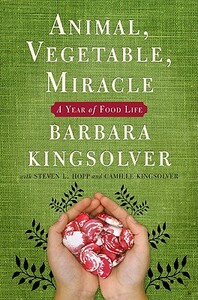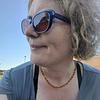Take a photo of a barcode or cover
A good book about eating sustainably and locally, but may seem a little unrealistic for those of us who don't live on a working farm.
informative
inspiring
fast-paced
While I won't be moving to a farm anytime soon, I can't look at what I eat the same way after reading this. You may feel guilty about the food you eat, but Kingsolver feels that knowledge and awareness is an important first step to becoming conscious consumers.
Everyone should read this book! First, she is a delightful writer and it is funny and witty and engaging. Beyond that, this book helps us to realize what it really means to be connected to the food that we put in our bodies and gives some perspective on how distant we as consumers are from that in this society.
Check out my review at http://bookaweekwithjen.blogspot.com/2009/05/book-42-of-52-animal-vegetable-miracle.html
This book inspired me to focus more on local eating: https://laceylouwagie.com/2023/01/25/the-new-years-resolution-post/
8/10
Barbara Kingsolver is one of my favorite authors but I wasn't sure how this non-fiction read would be.
Barbara Kingsolver is one of my favorite authors but I wasn't sure how this non-fiction read would be.
I found this book incredibly inspiring. Obviously, not everyone can grow and raise quite as much of their food as Kingsolver and her family did (especially not urban dwellers), but we can all stand to be a bit more thoughtful about what we eat and from whom we purchase it. Since reading this, I've already busted out some killer recipes with farmers' market produce and started to hatch a scheme to have a garden next spring.
Barbara Kingsolver's Poisonwood Bible is one of my all-time favorite novels, and since I have become more and more obsessed with eating fresh, local, organic foods, this book intrigued me as soon as it was first announced.
Kingsolver and her family decided to spend a full year eating only what they could grow and/or raise themselves. It helps to have the financial means to basically work from home for a year, not to mention a piece of land in a temperate area that has already been prepped for gardening on this scale. Kingsolver's husband, Steven Hopp, an environmental studies professor, wrote segments about the science behind organic foods. Camille Kingsolver also contriuted segments from an older teen perspective, as well as recipes the family used to take full advantage of their bounty.
I liked the book overall, and it did give me the final push to start preserving foods from the farmers' market (freezing and canning, for starters), but it did seem a bit ivory tower in parts. Most of us can't put work aside or work from home so easily, and this sort of food production requires either many hands or many additional hours in the day. Camille's segments also irritated me a bit... she's not the author her mother is. Still worth reading, but I'm looking forward to reading more of Barbara Kingsolver's fiction.
Kingsolver and her family decided to spend a full year eating only what they could grow and/or raise themselves. It helps to have the financial means to basically work from home for a year, not to mention a piece of land in a temperate area that has already been prepped for gardening on this scale. Kingsolver's husband, Steven Hopp, an environmental studies professor, wrote segments about the science behind organic foods. Camille Kingsolver also contriuted segments from an older teen perspective, as well as recipes the family used to take full advantage of their bounty.
I liked the book overall, and it did give me the final push to start preserving foods from the farmers' market (freezing and canning, for starters), but it did seem a bit ivory tower in parts. Most of us can't put work aside or work from home so easily, and this sort of food production requires either many hands or many additional hours in the day. Camille's segments also irritated me a bit... she's not the author her mother is. Still worth reading, but I'm looking forward to reading more of Barbara Kingsolver's fiction.






